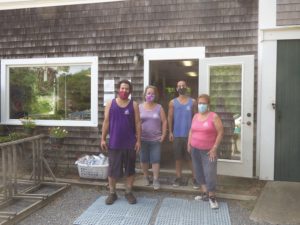PROVINCETOWN — Bill Meadows, who owns Ptown Bikes on Bradford Street, has sold 26 e-bikes since July. That’s many more than he would have sold, he said, had it not been for a rebate program that covers 75 percent of the cost of a Class 1 e-bike — up to $1,200 — for participants who earn 60 percent or less of state median income.
A Class 1 e-bike is equipped with a motor that provides assistance when the rider is pedaling up to a speed of 20 miles per hour. The voucher also covers the cost of bike accessories up to $120.
The rebate program was good for his business, Meadows said, but also for “a lot of people who were very excited to be able to buy an e-bike when there was no other way they could.”
The Cape Light Compact launched the rebate program with $496,125 in grant money it received from the Mass. Dept. of Energy Resources and Massachusetts Clean Energy Center as part of its $5-million Accelerating Clean Transportation for All program.
Seven bike shops across the Cape signed on to participate in the program, including three Provincetown businesses: Ptown Bikes, Gale Force Bikes, and the Bike Shack. Cape Light Compact helps participating shops by covering a portion of the cost of e-bikes up front to mitigate the financial burden of stocking the bikes; the Compact also pays an administrative fee of up to 10 percent of the retail price for each bike sold.
“The aim of the program is to increase access to transportation for residents living on the Cape who otherwise don’t have a means of transportation,” said Mariel Marchand of the Compact. Doing so “without increasing greenhouse gas emissions” is the goal, she said.
The cost of e-bikes can be prohibitive for would-be cyclists who don’t earn much money, Marchand said. Meadows said that most e-bikes cost $3,000 to $4,000.
Ptown Bikes sells two models of e-bikes; the least expensive is a one-speed cruiser that costs $1,600. With a $1,200 rebate, the $400 price tag becomes an affordable option for those who commute locally, Meadows said. One customer traveled a total of 900 miles this past summer alone, Meadows said.
Liz Athineos, who runs the Bike Shack, has not sold any bikes to customers using the vouchers. She thinks the high cost of e-bikes is an issue even with the program. “Cape Light is offering $1,200, which is a good amount of money, but really you need to spend at least $2,000 on a decent bike,” she said. The difference is still too much for a lot of customers, she said.
Cape Light hopes to give out up to 250 vouchers on a first come, first served basis. It has already issued around 200 vouchers, 100 of which have been redeemed, said Marchand. Participants have 90 days to use the vouchers after receiving them or they are distributed to other customers.
These initiatives help at the crossroads of accessibility and environmentalism, Meadows said. He said he has seen firsthand that “it puts bikes in the hands of people who otherwise never would have thought it was possible.”
Interested would-be e-cyclists can apply for the vouchers at the Cape Light Compact website at capelightcompact.org/ebikerebate/.

